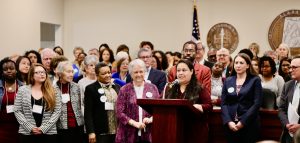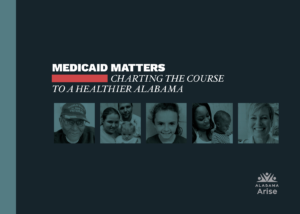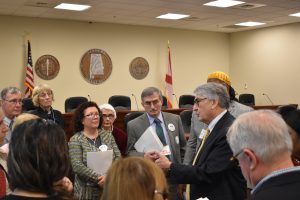Alabama must tear down the legacies of slavery and segregation
By Chris Sanders, communications director
In Birmingham, Mobile and cities across the country, officials are taking down monuments that “honored” a violent rebellion that sought to protect the enslavement of human beings. Removing these symbols of slavery and segregation is an important step toward healing and recovery, but it’s not enough. We also must remove policy barriers that trace their roots to these oppressive and racist practices.

Black Alabamians have battled generation after generation of discriminatory barriers to education, jobs, housing and voting. Compounding those barriers is a criminal justice system that polices Black people more heavily, arrests them more often and condemns them to harsher sentences in dangerously overcrowded prisons and jails.
For centuries, Black people have suffered from police brutality and unequal treatment from law enforcement. This history has fueled protests nationwide and worldwide over the last month.
Arise stands in solidarity with calls to stop the brutality against Black people and start building a world that’s safe for everyone.
All of these systemic failures have added together to produce a series of terrible disparities. Black Alabamians face higher rates of poverty and hunger, lower life expectancies and lower rates of employment and health insurance coverage.
Policy changes to break down harmful barriers
These are institutional failures that require policy solutions. Here are a few ways lawmakers can break down barriers to opportunity and justice:
-
- Expand Medicaid to cover adults with low incomes. Expansion would ensure health coverage for more than 340,000 Alabamians who are uninsured or barely paying for insurance they can’t really afford. It also would attack a fundamental injustice: People of color make up about 34% of our state’s population, but nearly half of all uninsured Alabamians with low incomes are people of color. Lack of affordable health coverage deprives Black people of timely care for cancer, diabetes, heart disease and other serious conditions. As the disproportionately high share of coronavirus deaths among Black Alabamians shows, health care access is literally a matter of life or death.
- Invest more in public education. Alabama’s state funding for K-12 and higher education, adjusted for inflation, is lower today than it was in 2008. This chronic underfunding hits many schools that primarily serve Black students especially hard.
- Equitably distribute funding for affordable housing and public transportation. Alabama has trust funds for both but hasn’t funded them yet. Lawmakers should fund public transportation to help everyone get to work, school and other places they need to go. Alabama should support the Housing Trust Fund to ensure people living in deep poverty have safe shelter. Our state also should commit to eliminating redlining, fighting housing discrimination and reducing residential segregation.
- Overhaul the criminal justice system and the death penalty. Areas with large Black populations often see a larger police presence. The weight of harsh sentences and criminal justice debt falls more heavily on these Alabamians as a result. Lawmakers should reform sentencing laws and ease the crushing burden of exorbitant fines and fees. They also need to end abuses of civil asset forfeiture and eliminate racial injustice in the death penalty system.
- Strengthen and expand voting rights. Voting barriers should find no home in the heart of the Civil Rights Movement. Automatic voter registration, no-excuse absentee voting and same-day registration are a few changes that would make voting more accessible. Alabama also should ease barriers to voting rights restoration for returning citizens.
- Raise the minimum wage and restore home rule to localities. Alabama is one of only five states with no state minimum wage law. Most employers operate under the federal minimum wage of $7.25 per hour. Birmingham tried to raise its minimum wage in 2016, but state lawmakers blocked that effort. The Legislature has that power due to the 1901 state constitution, whose authors explicitly said they aimed to “establish white supremacy in this state.” Alabama should lift constitutional barriers to home rule and empower local governments to make decisions.
A better, more inclusive future for Alabama
Undoing the legacies of slavery and segregation in Alabama will require more than reassuring words and vague platitudes. It will require substantive policy changes to break down centuries-old barriers and ensure all Alabamians have a chance to reach their full potential.
Many of these changes – and others not mentioned – won’t be easy. Some may not happen quickly. But we must keep advocating and working toward the day when they will. The road to dignity, equity and justice for all Alabamians remains long. But walking together and working together, we can and will reach that destination.
Listening sessions, annual meeting going online
By Debbie Smith, organizer
Listening sessions are your chance to weigh in on Arise’s work, and we want to hear from you! To protect our members’ health and safety, our listening sessions will be held online this year. Click here to see the full schedule and register today.
Our annual meeting and issue proposal process will look different this year, too. The annual meeting will be held online on Saturday, Oct. 3. Members will still vote on our issue priorities.
Member groups that want to recommend a new issue priority or a strategic change to a current one must submit a proposal online by Friday, Aug. 21. Click here for more information and to submit your proposal.
We miss meeting with our members across Alabama, and we can’t wait to see you again in person. Until then, we can’t wait to “meet” you online!
Federal leaders must help ease suffering
By Robyn Hyden, executive director
Here at Arise, we are both challenged and called to action by the incredible movement and possibilities of these times. Protesters are demanding more community investments and defunding of unjust, punitive carceral systems. Lawmakers have been slow to respond adequately to the pandemic. Meanwhile, Alabama’s COVID-19 deaths are increasing, with alarming patterns of racial and economic inequity.
As always, Arise will work to build dignity, equity and justice for all Alabamians. With your support, we’ll advance these federal advocacy priorities this summer:
- Push the U.S. Senate to pass a strong fifth COVID-19 relief bill that would boost SNAP, extend enhanced Medicaid matching rates and ideally provide more funding for Medicaid expansion.
- Track Alabama’s $1.9 billion share of CARES Act funding and urge the state to direct that money to struggling residents. (See our full recommendations here.)
- Seek more federal relief to support state budgets and provide direct assistance to people with low incomes.
I don’t know what the future holds. But by holding true to our vision and building power for the people, I know we can make it brighter.
A word about Arise membership
By Brenda Boman, development director
A strong membership is essential for Alabama Arise’s successful advocacy for policies that will help Alabamians with low incomes.
When we can tell a lawmaker, “Some of your constituents are Arise members,” it makes a difference. When you identify yourself to an elected official as an Arise member, it makes a difference.
Individual membership requires a financial contribution each year that demonstrates your commitment to our work. We suggest a donation of $15 or more, but we accept any amount you with which you feel comfortable. Your contribution makes you eligible to vote during membership meetings, including our annual meeting, where members choose our legislative priorities for the year.
Our membership count begins each year on July 1 and ends before our annual meeting the following year. If you’ve never joined as an individual member, I hope you’ll consider doing so. And if you’re a past member who hasn’t given since July 1, 2019, I hope you’ll renew today.
We need more than 400 renewals and new members to reach our membership goal of 2,020 in 2020. Please donate today to be included in the count!
We’re ramping up pressure for Medicaid expansion
By Jim Carnes, policy director
The double blow of the COVID-19 pandemic and the resulting economic shutdown has put Medicaid expansion in a new, more urgent light.
The virus’s disproportionate toll on Black Alabamians is exposing longstanding racial barriers to detection and treatment of underlying health conditions. And the number of uninsured Alabamians – already shockingly high before COVID-19 – will continue to grow as unemployment mounts.
Extending health coverage to adults with low incomes is the single biggest step Alabama can take to mitigate the pandemic’s impact on our health, health care system and economy.
Medicaid is a tool to solve problems and save lives. And three new Arise initiatives are taking different approaches to convince state leaders to maximize Medicaid’s effectiveness by covering working-age adults.

The Cover Alabama Coalition, launched April 15, coordinates the Medicaid expansion advocacy of Arise and nearly 90 other grassroots organizations. Arise’s new story collection project is a multimedia effort to elevate community voices in the health care conversation. And on June 17, we released a comprehensive new report, Medicaid Matters: Charting the Course to a Healthier Alabama, that looks at Alabama Medicaid from four angles: how it works now, how it’s improving coverage, who’s still left out and how we can make it stronger.
You can learn more about all of these projects on our Medicaid expansion page and at coveralabama.org.
Welcome to Arise, Jane!
 Jane Adams joined Alabama Arise in June as our campaign director. She also will direct the Cover Alabama Coalition, which has united Arise and nearly 90 other organizations across Alabama to push for Medicaid expansion.
Jane Adams joined Alabama Arise in June as our campaign director. She also will direct the Cover Alabama Coalition, which has united Arise and nearly 90 other organizations across Alabama to push for Medicaid expansion.
Jane is a ninth-generation Alabamian who lives in Huntsville. She earned a master’s degree in theological studies from Wesley Theological Seminary in Washington, D.C., where she studied the ethical implications of public policy.
Before joining Arise, Jane worked as a senior policy analyst for Bread for the World. While at Bread, she co-chaired the Save for All coalition, the largest anti-poverty coalition in the United States. Jane also spearheaded strategy for the Interfaith Health Care Coalition and the Faithful Farm Bill Coalition.
We’re excited to have Jane on our team! And we look forward to making Medicaid expansion a reality in our state. Visit coveralabama.org to learn more about Cover Alabama and how you or your organization can join the campaign.
Thank you, Sherrel
Story collection coordinator Sherrel Wheeler Stewart has accepted a job opportunity as executive director of strategy and communications for Birmingham City Schools and will depart the Arise staff in early July. We’re sorry to see Sherrel go, but we’re grateful for her great work in launching our Medicaid story collection project. Sherrel remains a huge Arise supporter, and we look forward to seeing her at future events!
We will be looking to hire a new story collection coordinator soon. Visit our employment page in the coming weeks for details on that position and any others that may be available.
Risk of education, General Fund cuts remains after shortened legislative session
By Chris Sanders, communications director
Funding for education, health care and other vital services is deeply uncertain as Alabama’s revenues plummet during the COVID-19 recession. In May, lawmakers enacted 2021 Education Trust Fund (ETF) and General Fund (GF) budgets that are larger than this year’s. But as consumer spending falls and massive unemployment persists, the Legislature will reevaluate those plans at hearings in early July.
Alabama’s bleak financial picture likely will force lawmakers to return for a special session later this summer or fall. And that’s far from the only subject they should address.
The pandemic has brought new urgency to the need to reduce overcrowding in state prisons, where social distancing is impossible. It has shown why legislators should undo harmful limits they imposed on unemployment insurance (UI) eligibility last year. And it has put unprecedented strain on our state’s health care infrastructure, particularly hospitals and clinics serving rural Alabamians. Medicaid expansion would provide financial stability for many of these facilities, helping them stay open during the pandemic and beyond.
A lost session
COVID-19 tore out the heart of the regular session, forcing lawmakers to stop meeting for more than a month. When they returned, they had just two weeks to finalize ETF and GF budgets. With most House Democrats staying home due to coronavirus concerns, legislative leaders limited the agenda to budgets and local bills.

That decision temporarily slowed momentum for Arise’s push to untax groceries. Before the session paused, about 200 people came to Montgomery for Arise Legislative Day on Feb. 25. Our members urged legislators to end the state sales tax on groceries while protecting education funding. The proposal would replace grocery tax revenue by limiting Alabama’s income tax deduction for federal income tax payments. Our supporters also advocated for Medicaid expansion and public transportation funding.
Whenever the Legislature returns, Arise will be there promoting policies to make life better for struggling Alabamians. Check our website and follow us on Facebook and Twitter for updates.
An overview of Arise materials on COVID-19
By Matt Okarmus, communications associate
As the COVID-19 pandemic continues, the news feels like it’s moving faster than ever. Arise policy analysts have worked hard to provide updates on policy solutions to help Alabamians during and after the pandemic. Read summaries of our recent resources below, and visit al-arise.local/blog to read our full posts on each subject and others.
COVID-19 resource guide
As unemployment soars, many Alabamians are deeply worried about basics like food, health care, housing and income. A lot of folks need help getting by but may not know quite where to look. Arise’s guide to public assistance programs and other support services is designed to help people meet their basic needs during this pandemic. Click here to read this continuously updated resource guide.
Community eligibility and SNAP
Community eligibility “is proving to be a firm foundation for emergency response during the COVID-19 pandemic,” hunger advocacy coordinator Celida Soto Garcia writes. Her blog post explains why every eligible Alabama school should embrace this powerful opportunity to reduce child hunger. In another post, policy analyst Carol Gundlach shows how recent federal SNAP improvements are helping struggling Alabamians keep food on the table. She also urges Congress to remove more eligibility barriers and increase SNAP benefits.
Unemployment insurance
The pandemic has caused an unprecedented increase in unemployment insurance (UI) claims. On our blog, policy analyst Dev Wakeley examines how this economic toll reveals the need to reverse harmful UI cuts and barriers that state lawmakers enacted last year. He also highlights how traditional UI and Pandemic Unemployment Assistance are helping workers endure this economic downturn.
Protection from predatory lenders
State and federal lawmakers need to enact strong protections for payday and title borrowers “before these harmful loans make the pandemic’s financial devastation even worse,” policy analyst Dev Wakeley writes. His post makes the case for rate caps and increased transparency as powerful, proven policy solutions to this problem.
Fighting COVID-19 in prisons and jails
State and local governments are responding in a variety of ways to Alabama’s coronavirus pandemic. But the response has fallen far short where incarcerated people are concerned, policy analyst Dev Wakeley writes. His post explains how quick, targeted releases would help save lives and avoid nightmarish outbreaks in prisons and jails.


